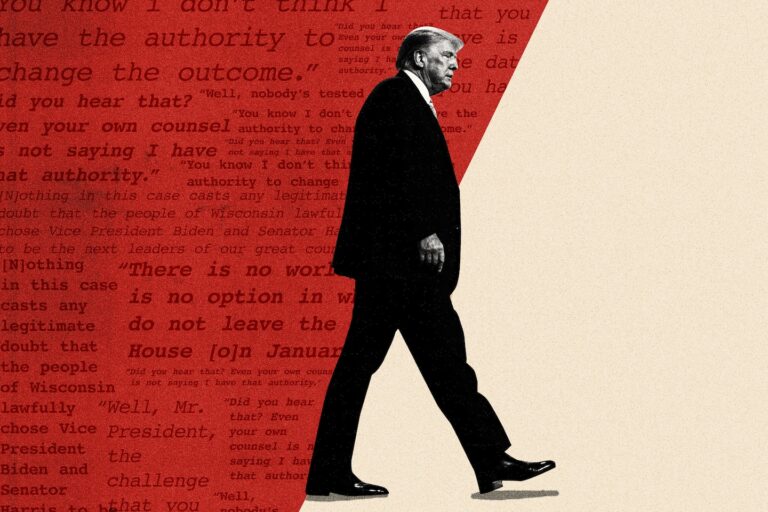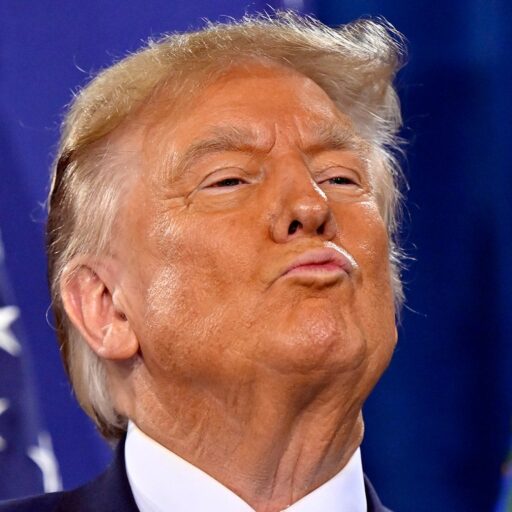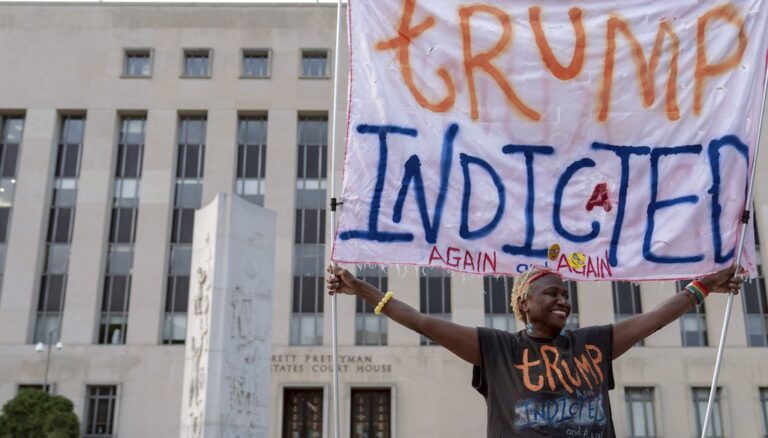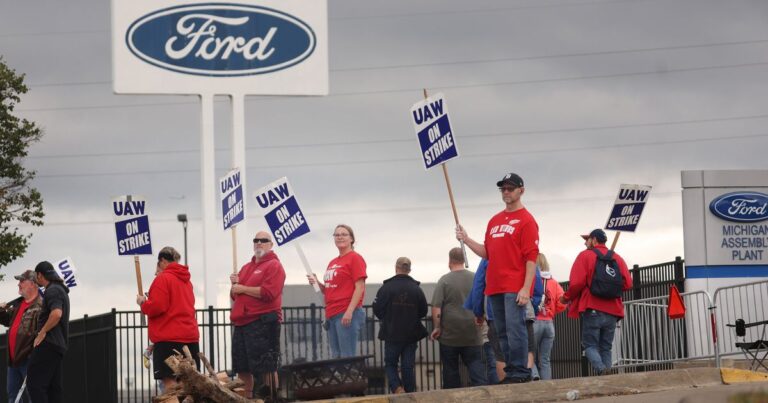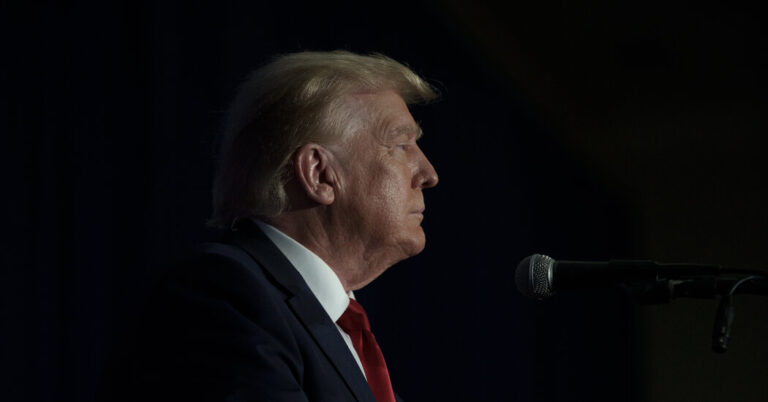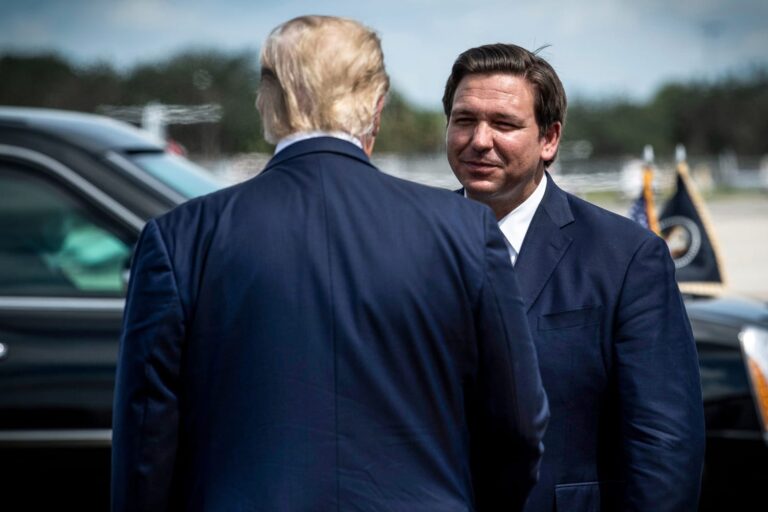A key premise of the federal prosecution’s case against former President Donald Trump for the events leading up to Jan. 6, 2021, is that Trump knowingly repeated false information, then leveraged those lies into actions aimed at overturning the 2020 election.
The Aug. 1 indictment says Trump was not misinformed, or delusional. Rather, it says he knew that certain claims about the election were false but repeated them anyway, in private and in public.
“The Defendant, his co-conspirators, and their agents made knowingly false claims that there had been outcome-determinative fraud in the 2020 presidential election,” the indictment says. “These prolific lies about election fraud included dozens of specific claims that there had been substantial fraud in certain states, such as that large numbers of dead, non-resident, non-citizen, or otherwise ineligible voters had cast ballots, or that voting machines had changed votes for the Defendant to votes for Biden.”
The indictment posits that Trump was “notified repeatedly that his claims were untrue — often by the people on whom he relied for candid advice on important matters, and who were best positioned to know the facts — and he deliberately disregarded the truth.”
How do you prove what someone was thinking?
Though this is a hard hurdle for prosecutors to clear, legal experts say it’s not insurmountable.
“A prosecutor commonly has to show it through circumstantial evidence,” said Joan Meyer, partner with the law firm Thompson Hine LLP and a former federal prosecutor. “The indictment lists the number of highly placed federal and state officials who told Trump that the election was not stolen and chronicles specific instances of Trump’s resistance to this advice.”
Here’s a sampling of instances in which confidants and officials directly told Trump that his claims were inaccurate, according to the indictment.
• Trump said that more than 30,000 noncitizens voted in Arizona. Trump’s own campaign manager told him such claims were false, as did then-Arizona House Speaker Rusty Bowers, a Republican who had supported Trump before the election.
• Trump said that Nevada had tens of thousands of fraudulent votes. Nevada’s then-secretary of state, Republican Barbara Cegavske, posted “Facts vs. Myths” on the agency’s website, debunking related claims.
• Trump said there were suspicious ballot handling activities at State Farm Arena in Atlanta. Senior U.S. Justice Department officials debunked this on two different occasions, with one official telling Trump the activities were “benign.” A senior campaign adviser — unnamed in the indictment, as is standard — told Trump this was untrue, calling such claims “conspiracy s— beamed down from the mothership.”
• Trump said there were enough dead voters in Georgia to flip the result in the state. In a phone call, Georgia Secretary of State Brad Raffensperger told Trump the actual number of dead voters was in the low single digits. A counsel to Raffensperger also told Trump that his claim was untrue that thousands of out-of-state residents had voted.
• Trump said there had been a suspicious “vote dump” in Detroit. Then-U.S. Attorney General William Barr told him that this was simply the normal vote-counting process and did not signal fraud. Earlier, the state Senate majority leader, Republican Mike Shirkey, told Trump that he had lost the state because of poor electoral performance.
• Trump said there had been 205,000 more votes in Pennsylvania than there were voters. On at least two occasions, the acting attorney general, Jeffrey Rosen, and the acting deputy attorney general, Richard Donoghue, told Trump that this was false.
• Trump said there had been more votes in Wisconsin than there were voters. Donoghue debunked this in a conversation with Trump.
The indictment also said Trump ignored a variety of debunkings of his claims that were offered by his own vice president, Mike Pence; the director of national intelligence; the Department of Homeland Security’s Cybersecurity and Infrastructure Security Agency (whose chief Trump fired after being contradicted); senior White House attorneys; and state and federal court rulings.
“The Defendant’s knowingly false statements were integral to his criminal plans,” the indictment says.
How can the government prove Trump’s state of mind?
Proving intent “is always difficult,” Sean Morales-Doyle, director of the voting rights program at the liberal Brennan Center for Justice at New York University Law School, told PolitiFact in July. “But that is a question at issue in almost every criminal prosecution. It’s the kind of thing prosecutors have to prove on a daily basis.”
Bradley Moss, a partner with the law firm Mark S. Zaid, P.C., added that “delusion and refusal to accept reality is not sufficient to disprove you had the requisite intent.”
Ultimately, prosecutors need to have faith in the willingness of juries to make reasonable inferences.
“Juries typically take their job seriously, and most listen intently and get it right when judging credibility,” said Meyer of Thompson Hine LLP. “Some of the witnesses will be prominent Republicans who joined Trump’s Administration with his approval. It is going to get old if Trump’s attorneys cross examine all of them as if they all are disloyal, disgruntled employees that Trump should have fired. At some point, that will fall flat as a strategy.”
PolitiFact staff writer Amy Sherman contributed to this report.
RELATED: Here’s what Donald Trump asked Georgia election officials in phone call about 2020 election

